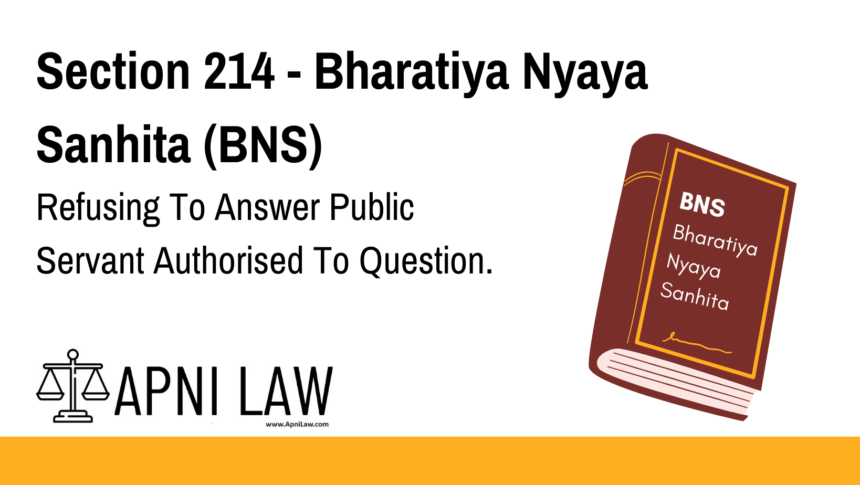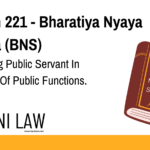Code: Section 214 BNS
Whoever, being legally bound to state the truth on any subject to any public
servant, refuses to answer any question demanded of him touching that subject by such
public servant in the exercise of the legal powers of such public servant, shall be punished
with simple imprisonment for a term which may extend to six months, or with fine which
may extend to five thousand rupees, or with both.
Explanation of Section 214 BNS
Section 214 of the Bharatiya Nyaya Sanhita (BNS) deals with cases where a person refuses to answer questions posed by a public servant who is legally authorized to ask them.
This provision ensures that public officials can perform their duties efficiently, especially in investigations, inquiries, and legal proceedings.
Key Provisions of Section 214 BNS:
- Who Does This Law Apply To?
- Any person questioned by a public servant who is legally authorized to ask them.
- What Constitutes an Offense?
- Refusing to answer a question when legally required to do so, without a valid excuse.
- Punishment for Violation:
- Imprisonment: Up to six months.
- Fine: Up to ₹5,000.
- Both: In some cases, both penalties may be imposed.
Illustrations of Section 214 BNS
Example 1: Police Investigation
A police officer questions a person in connection with a fraud case, and the person refuses to answer without any legal justification. They can be punished under Section 214 BNS.
Example 2: Government Inquiry
A tax officer asks a businessman for details about an undisclosed income source, and the businessman refuses to respond. This non-compliance may attract legal consequences.
Example 3: Judicial Investigation
A person summoned in a judicial inquiry refuses to answer questions from a judge or magistrate without a valid excuse. They can face legal action under this section.
Common Questions and Answers on Section 214 BNS
1. What kind of public servants are authorized under this section?
This law applies to police officers, magistrates, tax officials, revenue officers, and other public servants empowered by law to ask questions.
2. Can I refuse to answer if I am afraid of self-incrimination?
Yes. The right against self-incrimination is protected under Article 20(3) of the Indian Constitution. You cannot be forced to provide answers that may implicate you in a crime.
3. Does this section apply only to criminal cases?
No. This provision applies to any legal inquiry, including administrative, tax, and judicial proceedings.
4. Is Section 214 BNS a bailable offense?
Yes. Offenses under Section 214 BNS are generally bailable and non-cognizable, meaning arrest without a warrant is not allowed.
5. What is considered a lawful excuse for refusing to answer?
A person can refuse if:
- The question violates their right against self-incrimination.
- The question is outside the scope of legal authority.
- They have a privileged communication (e.g., lawyer-client privilege).
Conclusion
Section 214 of the Bharatiya Nyaya Sanhita (BNS) ensures that individuals cooperate with legally authorized inquiries. However, a person has the right to remain silent if answering violates their legal protections.
For more legal insights, visit ApniLaw today! 🚀











